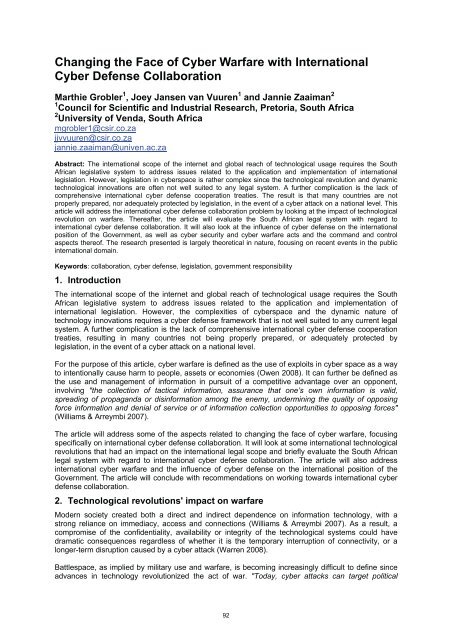6th European Conference - Academic Conferences
6th European Conference - Academic Conferences
6th European Conference - Academic Conferences
You also want an ePaper? Increase the reach of your titles
YUMPU automatically turns print PDFs into web optimized ePapers that Google loves.
Changing the Face of Cyber Warfare with International<br />
Cyber Defense Collaboration<br />
Marthie Grobler 1 , Joey Jansen van Vuuren 1 and Jannie Zaaiman 2<br />
1<br />
Council for Scientific and Industrial Research, Pretoria, South Africa<br />
2<br />
University of Venda, South Africa<br />
mgrobler1@csir.co.za<br />
jjvvuuren@csir.co.za<br />
jannie.zaaiman@univen.ac.za<br />
Abstract: The international scope of the internet and global reach of technological usage requires the South<br />
African legislative system to address issues related to the application and implementation of international<br />
legislation. However, legislation in cyberspace is rather complex since the technological revolution and dynamic<br />
technological innovations are often not well suited to any legal system. A further complication is the lack of<br />
comprehensive international cyber defense cooperation treaties. The result is that many countries are not<br />
properly prepared, nor adequately protected by legislation, in the event of a cyber attack on a national level. This<br />
article will address the international cyber defense collaboration problem by looking at the impact of technological<br />
revolution on warfare. Thereafter, the article will evaluate the South African legal system with regard to<br />
international cyber defense collaboration. It will also look at the influence of cyber defense on the international<br />
position of the Government, as well as cyber security and cyber warfare acts and the command and control<br />
aspects thereof. The research presented is largely theoretical in nature, focusing on recent events in the public<br />
international domain.<br />
Keywords: collaboration, cyber defense, legislation, government responsibility<br />
1. Introduction<br />
The international scope of the internet and global reach of technological usage requires the South<br />
African legislative system to address issues related to the application and implementation of<br />
international legislation. However, the complexities of cyberspace and the dynamic nature of<br />
technology innovations requires a cyber defense framework that is not well suited to any current legal<br />
system. A further complication is the lack of comprehensive international cyber defense cooperation<br />
treaties, resulting in many countries not being properly prepared, or adequately protected by<br />
legislation, in the event of a cyber attack on a national level.<br />
For the purpose of this article, cyber warfare is defined as the use of exploits in cyber space as a way<br />
to intentionally cause harm to people, assets or economies (Owen 2008). It can further be defined as<br />
the use and management of information in pursuit of a competitive advantage over an opponent,<br />
involving "the collection of tactical information, assurance that one’s own information is valid,<br />
spreading of propaganda or disinformation among the enemy, undermining the quality of opposing<br />
force information and denial of service or of information collection opportunities to opposing forces"<br />
(Williams & Arreymbi 2007).<br />
The article will address some of the aspects related to changing the face of cyber warfare, focusing<br />
specifically on international cyber defense collaboration. It will look at some international technological<br />
revolutions that had an impact on the international legal scope and briefly evaluate the South African<br />
legal system with regard to international cyber defense collaboration. The article will also address<br />
international cyber warfare and the influence of cyber defense on the international position of the<br />
Government. The article will conclude with recommendations on working towards international cyber<br />
defense collaboration.<br />
2. Technological revolutions' impact on warfare<br />
Modern society created both a direct and indirect dependence on information technology, with a<br />
strong reliance on immediacy, access and connections (Williams & Arreymbi 2007). As a result, a<br />
compromise of the confidentiality, availability or integrity of the technological systems could have<br />
dramatic consequences regardless of whether it is the temporary interruption of connectivity, or a<br />
longer-term disruption caused by a cyber attack (Warren 2008).<br />
Battlespace, as implied by military use and warfare, is becoming increasingly difficult to define since<br />
advances in technology revolutionized the act of war. "Today, cyber attacks can target political<br />
92

















